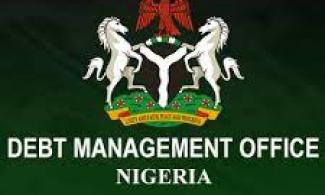
According to the DMO, a government agency, in December 2021, the country’s debt stood at N39.556 trillion but within three months of 2022, the country had an additional N2.048 trillion to the debt profile.
Amid the gruelling economic challenges facing the country, the Muhammadu Buhari-led government between January and March 2022 incurred N2trillion in Public Debt, bringing total debts to record N41trillion, according to a release from the Debt Management Office.
According to the DMO, a government agency, in December 2021, the country’s debt stood at N39.556 trillion but within three months of 2022, the country had an additional N2.048 trillion to the debt profile.

Meanwhile, the country in the first quarter of 2022 alone, has spent an average of N9.94billion on debt servicing, a report by a civic group, Dataphyte, noted.
Every day of the last three months, Nigeria has spent an average of N9.94billion daily on debt service.
Combined, the cost of debt servicing in Q1 2022 alone is N895 billion which is already 32% of the total debt servicing figure for 2021.
As contained in the DMO report, between January and March 2022, Nigeria spent N668,685,710,112.98 on servicing domestic debt.
The domestic loan service was broken down as N188.364 billion in January, N103.883 billion in February and N376.437 billion in March.
“The Q1 2022 debt servicing bill is 215% higher than the figures for Q4 2021,” the report noted.
Meanwhile, the country had spent $548,789,178.51 on external loan servicing.
The figure for the first quarter of 2022 is 1,900 times higher than that of the last quarter of 2021.
“This astronomical increase of foreign debt service figures in Q1 2022 is the highest in at least each quarter of the last 12 years,” the analysis stated.
In Q1 2022 alone, N895billion had been spent on debt servicing, an amount exceeding the 2022 budget of each state in Nigeria except Lagos State.
The total allocation to the Health sector in the 2022 budget is N724billion, 23.6% lesser than the bill for servicing Nigeria’s debts in Q1 2022.
”The debt servicing bill for the last quarter is 93.6% of the total allocation to the Education sector in the 2022 budget which is N923.7billion. In fact, the debt servicing figure is 68% of the total revitalisation fund at the centre of disagreements between lecturers and the federal government.
”The debt servicing figure is 66% of Nigeria’s 2022 Defence budget which is N1.2trillion. The budget of Nigeria’s challenged Power Sector, with 5 national grid collapses in the 6 months since the start of 2022 is N306billion and it's 65% lesser than the cost of servicing debts in Q1 of 2022.
”Allocation to the Agricultural Sector touted as Nigeria’s post-oil economy saviour, is N215.8billion and it is 79% lesser than debt servicing costs for the first quarter of 2022."
The increasing debt profile remains a subject of concern. The International Monetary Fund has warned that Nigeria may spend all of its 2022 revenue, N10.74trillion on debt servicing.
With the sum of N2.048trillion borrowed within the first three months of the year, comprising domestic borrowings amounting to N1.28trillion and external borrowings which stood at N762billion. The current debt figure shows that Nigeria has expended 41.88% of its debt target for the 2022 fiscal year between January and March.